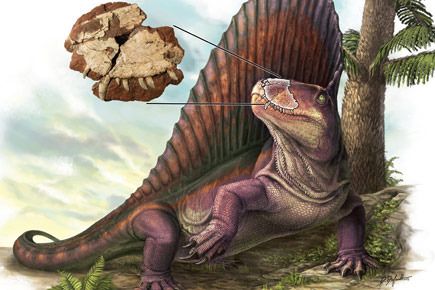Researchers solve P.E.I. dinosaur fossil mystery. Here's how
Digital Reporter
Friday, November 27, 2015, 3:57 PM - After 170 years, researchers have finally solved the mystery behind one of Canada's earliest dinosaur fossils.
The specimen, part of an upper jaw including several sharp teeth, has been linked to Dimetrodon borealis, by a team of Canadian scientists who published findings in the Canadian Journal of Earth Sciences this week.
It is the only one ever excavated in the country and is the second oldest vertebrate fossil known from Canada.
The fossil was first discovered in P.E.I. in 1854 while a farmer was digging a well on his property near French River.

It was sold to the Academy of Natural Science in Philadelphia where paleontologist Joseph Leidy first identified the fossil as Bathygnathus borealis, meaning "deep jaw from the north," according to the report.
![]() RELATED: Canada's oldest dinosaur bones revealed. Here's where
RELATED: Canada's oldest dinosaur bones revealed. Here's where
Through the use of family trees and imaging techniques, researchers from the University of Toronto (Mississauga), Carleton University and the Royal Ontario Museum, were able to properly identify the fossil, linking the roots of eight preserved teeth back to the Dimetrodon family.
Dimetrodons date back to the Permian period around 290 million years ago. They were mammal-like reptiles that were known for their large "sails" along their spines.
The specimen has been studied several times by paleontologists since it was first named. It is believed that Dimetrodon went extinct 40 million years before the dinosaurs.
"This greatly expands our knowledge of these early relatives of modern mammals, as well as the history of life in Canada," Carleton University's Hillary Maddin, professor of earth sciences said in a press release.
"It's really exciting to discover that the detailed anatomy of the teeth has finally allowed us to identify precisely this important Canadian fossil," noted Kirstin Brink, lead author of the study. "Dimetrodon is actually more closely related to mammals than it is to dinosaurs."
Source: Study | CBC | Carleton University
Watch more: A rare discovery in Montana



